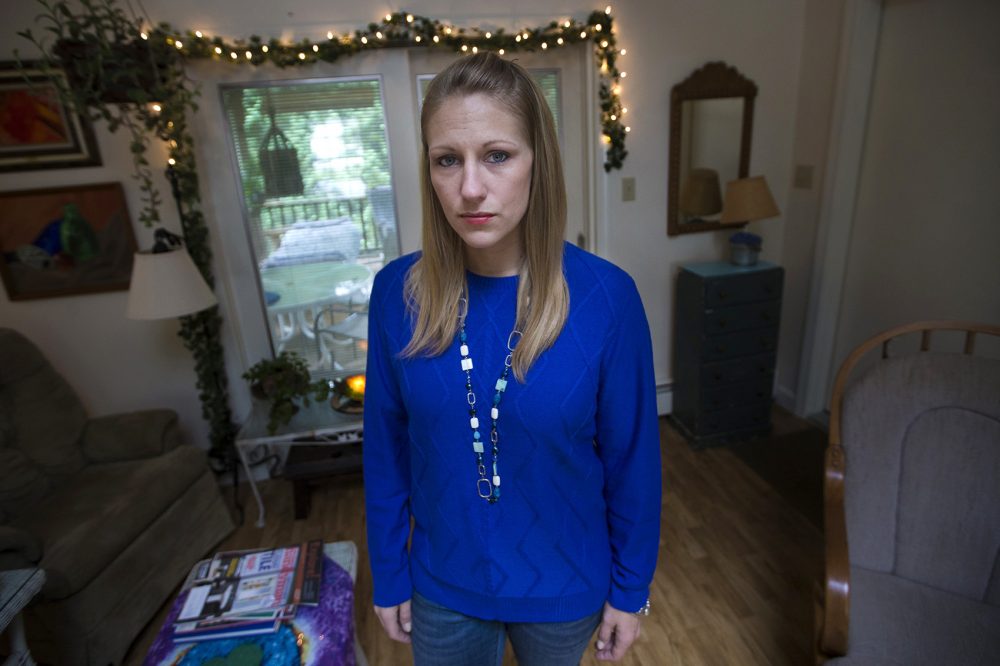Advertisement
Mass. High Court Hears Arguments Against Drug-Free Probation Requirement
Resume
Justices of the Massachusetts Supreme Judicial Court are reviewing some complex questions about how courts deal with addiction.
Arguments heard by the SJC on Monday involve whether courts can require someone with a substance use disorder to remain drug-free.
The justices asked tough questions of both sides, starting with attorney Lisa Newman-Polk. Her client, Julie Eldred, was sent to jail for failing a drug test while on probation for a larceny charge.
Newman-Polk says it's not fair to incarcerate someone with addiction for something like relapse because that's not a willful violation of probation.
Here is Justice Barbara Lenk asking Newman-Polk what types of probation conditions should be imposed on someone with a substance use disorder:
"You've said random drug screens are OK."
"Sure."
"The condition of 'no further crimes'?"
"Sure, yes."
"Anything else is OK? The only thing that's not OK, basically, is the one that you're objecting to?"
"The one thing we're objecting to is the criminalization of relapse."
Newman-Polk says probation officers should work with medical treatment providers to determine the best care for someone with addiction — even if a probationer has to be involuntarily committed to treatment. Essentially, Newman-Polk says, the courts should not move so quickly to incarcerate.
Is that a slippery slope, though, Justice Lenk asked, especially if a probationer can't control his or her behavior?
"Now, if somebody didn't have the ability to resist the urge to use drugs, how is that she could resist the urge to commit other petty crimes in order to support her drug habit?" Lenk asked. "How is it that she could have the self control to continue in a treatment program that presumably doesn't want her to use drugs?"
Crimes should be punished, Newman-Polk responded, but committing crimes is not a symptom of addiction.
Then it was the state's turn, with Assistant Massachusetts Attorney General Maria Granik. Justice Lenk asked her, if the court orders someone with a substance use disorder to remain drug-free, is that setting them up for failure?
Granik said no. She argues that the courts already have systems to steer people to treatment and away from incarceration. Granik says there is no dispute that addiction is a disease, and tough probation conditions protect public safety.
Chief Justice Ralph Gants asked Granik about judicial discretion. What if a judge decided to use the probation violation to sentence Eldred for the underlying crime of larceny?
"What you need to come to grips with — and I don't hear it, frankly — is, is it appropriate for a judge under these circumstances, recognizing that relapse is something that routinely occurs in these circumstances, to impose a two-and-a-half-year sentence in the house of correction for her probation violation?
"I think that it would certainly be unwise..."
"Is it unlawful?"
"Whether it rises to the level of a constitutional violation in all cases of substance use disorder, I don't think we could go that far."
Gants says he has to consider the SJC's role in issuing guidelines for all courts.
"This is a really challenging issue, and each side needs to come to grips with it because judges have to do this each and every day," he said.
The woman at the center of these arguments was in court to watch them.
Eldred says it was difficult to see her story described as a statewide legal issue, but she hopes it helps.
"To me it's worth it, even if the outcome isn't what we want," she said. "I just want to get it out there because there so many people in my situation that have a real problem."
A court ruling is expected within four months.
This article was originally published on October 02, 2017.
This segment aired on October 2, 2017.
